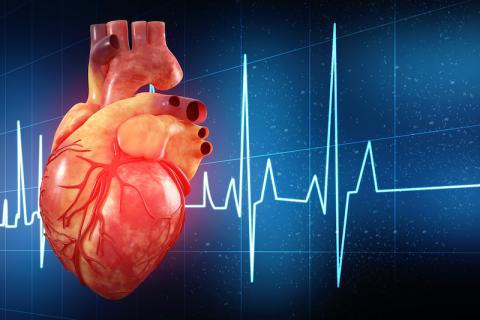
A new UK Coronavirus Immunology Consortium study led by researchers from the University of Birmingham suggests that severe COVID-19 infections may trigger an autoimmune response against the heart.
Heart problems are one of a number of recognised complications of COVID-19, but the biological mechanism underpinning this link remains unclear. One theory is that COVID-19 infection triggers an autoimmune response, where the immune system is misdirected to attack a person’s own tissues or organs.
It’s widely accepted that infection can in some cases lead to autoimmune disease, and there are reports of COVID-19 infection being associated with a number of autoimmune disorders including Guillain-Barré syndrome.
The research team behind this new study had previously found that autoantibodies against the skin, muscle, and heart could remain in a person’s system following severe COVID-19.
In light of these findings, they set out to measure the levels of a specific type of antibody associated with heart disease (anti-desmoglein 2) in the blood of people with – and recovering from – COVID-19 infections of varying severity.
They recruited 39 people with severe COVID-19 who were in intensive care at the time of sample collection, and 25 people who had been recovering for three to six months after being discharged from intensive care. They compared results from this group with those of a group of 40 healthcare workers who had COVID-19 in spring 2020 but had not been hospitalised, a separate group of sixteen people admitted to intensive care for a reason other than COVID-19, 42 patients who had been admitted to hospital with flu, 42 healthy controls and 34 patients who had heart disease unrelated to COVID-19.
Higher levels of the antibody were found to remain in the system of people recovering from severe COVID-19 infections, and the levels of these were similar to those seen in people with heart disease not associated with COVID-19. By contrast, the antibodies were not seen in healthy controls or people recovering from flu.
The researchers also examined tissue from people who had died from COVID-19, and found evidence of structural changes in the connections between heart cells where the desmoglein 2 target is located.
The team’s results, published as a preprint (and therefore not yet peer reviewed), suggest that autoimmunity to this protein may be a factor in producing unexpected heart-related complications following COVID-19 infection, and may represent the discovery of a new biomarker for heart damage and/or Long Covid.
Professor Alex Richter of the University of Birmingham commented: "Our results show an apparent link between a specific autoimmune response and the disruption of heart function seen in some people after severe COVID-19. This may help to understand the mechanisms leading to the long-term complications experienced by many after an infection, and may even point to a potential biomarker.
Further research will be needed to establish whether this particular autoimmune response is indeed causing abnormal heart function following infection with SARS-COV-2."
This work was partially supported by the UK Coronavirus Immunology Consortium (UK-CIC), funded by UK Research and Innovation and the National Institute for Health Research. Our grateful thanks go to all of those who volunteered to take part in this study.
For more information, details of the full paper are as follows: Ward et al. 2022. SARS-CoV-2 infection is associated with anti-desmoglein 2 autoantibody detection. MedRxiv DOI:10.1101/2022.07.26.22278002
